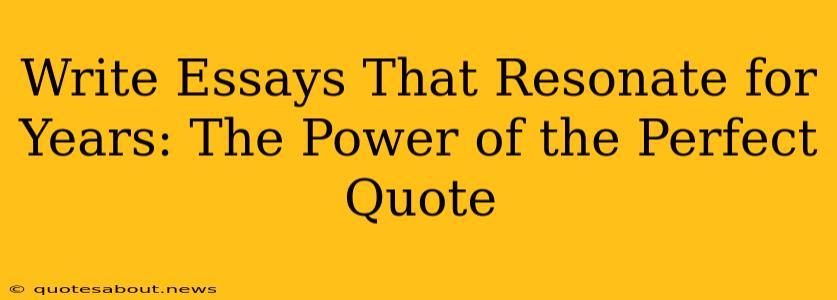The lifespan of an essay isn't measured solely in its initial impact. Truly great essays transcend fleeting trends and linger in the reader's mind long after the last word is read. One key ingredient in this enduring power? The perfect quote. A well-chosen quote can act as a keystone, supporting the entire structure of your argument and leaving an indelible mark on the reader’s memory. But finding and effectively integrating the right quote is an art form, requiring careful consideration and strategic placement.
Why Quotes Enhance Essay Impact?
Quotes offer several crucial benefits to essay writing:
-
Authority and Credibility: A quote from a respected expert immediately lends weight to your argument. It demonstrates that your ideas are rooted in established knowledge and bolster your credibility as a writer. Think of it as summoning a powerful ally to your cause.
-
Conciseness and Impact: A well-crafted quote can encapsulate a complex idea far more succinctly and memorably than any amount of paraphrasing. It cuts through the noise and delivers a powerful punch.
-
Emotional Resonance: Quotes often tap into the emotional core of an argument. A carefully chosen quote can evoke empathy, inspire reflection, or even provoke a strong reaction, solidifying the reader's connection to your work.
-
Illustrative Power: Quotes serve as vivid illustrations of your points. Instead of abstractly describing a concept, a relevant quote provides a concrete example, making the abstract tangible and easier to grasp.
-
Memorability: A striking quote acts as a memorable anchor point, helping readers retain the essay's core message long after they've finished reading. Think of famous quotes—they stick with us because they’re both insightful and memorable.
Choosing the Perfect Quote: A Strategic Approach
Selecting the right quote isn’t about randomly sprinkling quotations throughout your essay. It’s a strategic process:
-
Relevance is Paramount: The quote must directly support your argument. It should clarify, exemplify, or extend your point in a meaningful way.
-
Context is King: Don't simply drop a quote into your essay. Provide sufficient context to explain its relevance and significance. Explain who said it, when, and why it's pertinent to your argument.
-
Variety is the Spice of Life: Avoid over-reliance on a single source. Diversify your quotes to represent a range of perspectives and voices, enriching the overall analysis.
-
Attribution is Essential: Always properly attribute the quote, including the author’s name and the source. This is crucial for maintaining academic integrity and avoiding plagiarism.
-
Avoid Overuse: Too many quotes can disrupt the flow of your essay. Use quotes strategically, reserving them for moments where they offer significant value.
Common Mistakes to Avoid
-
Over-quoting: Don't let quotes dominate your essay. Remember, it's your voice and analysis that should drive the piece.
-
Misinterpreting quotes: Ensure you understand the quote's original meaning and use it appropriately within your context. Misinterpreting a quote can severely damage your credibility.
-
Ignoring context: Failure to provide adequate context renders a quote meaningless and undermines your argument.
How to Integrate Quotes Effectively
-
Introduce the quote: Briefly explain why you are including the quote and how it relates to your argument.
-
Embed the quote seamlessly: Don't just slap the quote in; integrate it grammatically into your sentence structure.
-
Analyze the quote: After presenting the quote, analyze its significance and explain how it supports your point.
People Also Ask:
Q: How can I find quotes relevant to my essay topic?
A: Use online databases like JSTOR, Google Scholar, or specialized quote collections. Explore books, articles, and speeches related to your topic. Remember to critically evaluate the source's credibility.
Q: Can I use quotes from fictional works in academic essays?
A: Yes, but use them judiciously and only when they directly support your argument and add substantial value to your analysis. Clearly identify the source (author and work).
Q: What if I can't find the perfect quote?
A: Don't panic! While a perfect quote can significantly strengthen your essay, a well-reasoned argument doesn't necessarily require them. Focus on crafting clear, compelling prose that supports your claims effectively.
By mastering the art of incorporating quotes, you can craft essays that resonate for years to come. The perfect quote is not simply a decorative element; it's a strategic tool that amplifies your message, enhances your credibility, and leaves a lasting impression on your reader. The ability to strategically utilize quotes is a mark of a skilled and thoughtful writer—a skill that will serve you well throughout your writing journey.

